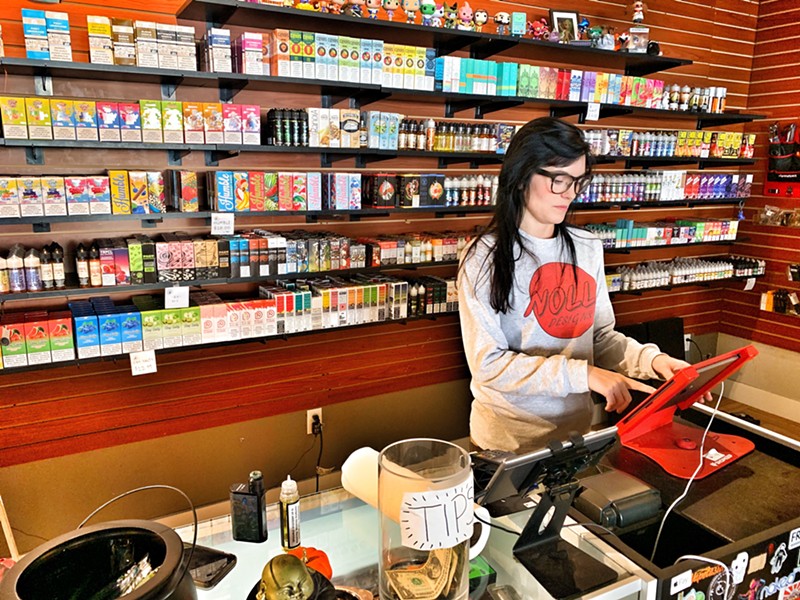Colorado high-schoolers are leading the nation in vape use, and Governor John Hickenlooper has had enough. On November 2, Hickenlooper's office released an executive order directing state agencies to take action to limit the "use of tobacco products, vaping products, and e-cigarettes by youth." The governor is recommending that the Department of Revenue, Department of Public Health and Environment and state legislature all take action to fight the youth-vaping epidemic.
"We're just trying to help kids. Nicotine is especially harmful when the brain is still developing," says Dr. Tista Ghosh of the Colorado Department of Public Health and Environment, who helped draft the executive order.
Ghosh points to data that shows that kids who vape are more likely to engage in certain dangerous behaviors, like risky sexual activity, cocaine use, prescription-pill abuse, marijuana consumption and binge drinking. And they're also more likely to eventually smoke actual cigarettes.
Marketed as a safer alternative to smoking, e-cigarettes generate a vaporized liquid, which comes in different flavors, made up of 3 to 6 percent nicotine. The pens are usually small and look like everything from a thumb drive to an actual writing pen.
The vaping industry is welcoming some of the suggested tactics offered by the executive order, like increasing inspections of stores that sell vape products to make sure they aren't being sold to kids. But some in the industry are concerned about the executive order's other recommendations, which could lead to statewide legislation that they say would destroy the nascent industry.
Hickenlooper's executive order asks the state legislature to consider requiring licensing of vape retailers, strengthening age-verification practices for online sellers, updating the Colorado Clean Indoor Air Act to "restrict the use of e-cigarettes in public places where cigarette and marijuana use is already prohibited," and raising the minimum age for purchasing vaping products from eighteen to 21.
Shanna Finch has managed Denver Vapor, a chain of three vape stores in Colorado, with her mother and brother for four years. Finch wants to work to prevent kids from buying vapes and says that her store is strict about verifying a prospective client's age.
"I'm fine with people checking to see if we're selling to minors. I'm also fine with licensing and do think that we should be regulated," Finch says.
Finch also recognizes that some bottles of e-cigarette juice may be a bit too colorful and appealing to kids. "The bottles shouldn't look like candy," she says.
But Finch is more worried the state may ban flavored vaping products, which the executive order asks the legislature to consider. San Francisco voters overwhelmingly banned the sale of such products in June 2018. And the FDA is investigating major vape manufacturers to see if they are marketing to children. The department has already placed the onus of proving that electronic cigarettes can be kept out of the hands of kids on manufacturers, giving the industry a deadline of November 12. On Tuesday, November 13, e-cigarette manufacturer JUUL announced it would remove flavored products from its stores to appease the FDA. Flavored products will be available online, albeit with stricter age verification requirements.
Colorado's executive order is in lockstep with the FDA's actions, something that greatly concerns Finch.
"The majority of adult customers want fruit or dessert or Sour Patch flavors. It tastes better and they don't smell like an ashtray," Finch says. The variety of tasty flavors is one of the reasons Finch was able to quit smoking cigarettes herself, a habit she picked up when she was fourteen.
Finch worries about what would happen to her small, family-owned business and many others like hers if the Colorado Legislature or the FDA were to prohibit the sale of flavored juices.
"75 percent of our sales are e-liquids. It would just wipe us out and kill the industry in Colorado," Finch says. "I want to know if they realize that this would kill off a lot of small businesses."
Ghosh says that she and the others working on the governor's efforts to end Colorado's youth vaping epidemic are open to hearing concerns like Finch's.
"We’re open to looking at what works. I don’t think we’re married to a specific strategy. Those are things that we absolutely would be willing to listen to and work through as we try to come up with solutions. If somebody in the legislature picks it up, we absolutely would be talking with stakeholders," says Ghosh.
Update, November 13: This story has been updated to reflect JUUL's mandates as of November 13.
[
{
"name": "Air - MediumRectangle - Inline Content - Mobile Display Size",
"component": "12017618",
"insertPoint": "2",
"requiredCountToDisplay": "2",
"watchElement": ".fdn-content-body",
"astAdList": [
{
"adType": "rectangle",
"displayTargets": "mobile"
}
]
},{
"name": "Editor Picks",
"component": "17242653",
"insertPoint": "4",
"requiredCountToDisplay": "1",
"watchElement": ".fdn-content-body",
"astAdList": [
{
"adType": "rectangle",
"displayTargets": "desktop|tablet"
},{
"adType": "rectangle",
"displayTargets": "desktop|tablet|mobile"
}
]
},{
"name": "Inline Links",
"component": "18838239",
"insertPoint": "8th",
"startingPoint": 8,
"requiredCountToDisplay": "7",
"maxInsertions": 25
},{
"name": "Air - MediumRectangle - Combo - Inline Content",
"component": "17261320",
"insertPoint": "8th",
"startingPoint": 8,
"requiredCountToDisplay": "7",
"maxInsertions": 25,
"watchElement": ".fdn-content-body",
"astAdList": [
{
"adType": "rectangle",
"displayTargets": "desktop|tablet"
},{
"adType": "rectangle",
"displayTargets": "desktop|tablet|mobile"
}
]
},{
"name": "Inline Links",
"component": "18838239",
"insertPoint": "8th",
"startingPoint": 12,
"requiredCountToDisplay": "11",
"maxInsertions": 25
},{
"name": "Air - Leaderboard Tower - Combo - Inline Content",
"component": "17261321",
"insertPoint": "8th",
"startingPoint": 12,
"requiredCountToDisplay": "11",
"maxInsertions": 25,
"watchElement": ".fdn-content-body",
"astAdList": [
{
"adType": "leaderboardInlineContent",
"displayTargets": "desktop|tablet"
},{
"adType": "tower",
"displayTargets": "mobile"
}
]
}
]













